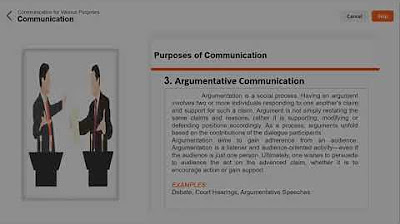PSY 2510 Social Psychology: The Source of a Persuasive Message
Summary
TLDRThis video explores the dynamics of persuasive communication, focusing on the importance of the message source. It emphasizes that credible and likable sources—those who are seen as competent and trustworthy—are generally more persuasive. However, personal involvement in an issue can reduce the impact of source characteristics, with people more influenced by the strength of arguments when deeply engaged. The video also introduces the 'sleeper effect,' where non-credible sources can become more persuasive over time as people forget the source but retain the message.
Takeaways
- 😀 High source credibility boosts persuasion, while low credibility reduces its effect on attitude change.
- 😀 People tend to remember the message from high-credibility sources in the short term but forget the source over time.
- 😀 The sleeper effect explains how low-credibility sources can increase persuasion as people forget the source but remember the message.
- 😀 Trustworthiness and competency are key components of source credibility, influencing how persuasive the message is.
- 😀 People are more likely to trust sources who seem to act in their best interests rather than those with perceived self-interests.
- 😀 Source likability, including physical attractiveness and similarity, plays an important role in persuasive effectiveness.
- 😀 In situations with high involvement or personal interest, people focus on message content rather than the source’s credibility or likability.
- 😀 Attractive people or those with high credibility are more persuasive when people are less involved or not paying full attention.
- 😀 Over time, people who initially heard a message from a high-credibility source may become less persuaded as the source's influence fades.
- 😀 Persuasion strategies vary depending on how involved the audience is, with low involvement leading to greater reliance on peripheral cues like source attractiveness.
Q & A
What are the two main components of credibility in persuasive communication?
-The two main components of credibility are *competency* (knowledgeable or skilled in the topic) and *trustworthiness* (honest and not misleading).
How does the *competency* of a source impact persuasive communication?
-Competency makes a source more persuasive in areas related to their expertise. For example, an expert in economics, like Warren Buffett, is more persuasive when discussing financial topics but may not be as effective when discussing unrelated subjects.
Why is trustworthiness important in persuasive communication?
-Trustworthiness is essential because people are more likely to be persuaded by sources they believe have no hidden motives or biases. A source that is perceived as genuinely caring about the audience's well-being is more persuasive.
How does *likability* influence persuasion?
-People are more likely to be persuaded by sources they find *likable*, which includes individuals they perceive as similar to themselves or physically attractive. This increases attention, warmth, and trust, which makes them more effective in influencing others.
What role does personal involvement play in persuasion?
-Personal involvement affects how people process persuasive messages. When people are highly involved in an issue, they tend to rely on careful, thoughtful evaluation of the message (central route). When they are less involved, they are more influenced by peripheral cues such as source attractiveness or credibility.
Can the source's credibility change over time? How?
-Yes, over time, the perceived credibility of a source can diminish as people forget the source itself but still remember the message. This results in the *sleeper effect*, where initially low-credibility sources can become more persuasive as the association with the source weakens.
What is the *sleeper effect*?
-The *sleeper effect* refers to the phenomenon where a message from a low-credibility source becomes more persuasive over time as the audience forgets the source but retains the message. Conversely, high-credibility sources lose persuasive impact over time.
How does the attractiveness of a source affect persuasion?
-Attractive individuals are more persuasive because they capture more attention and are viewed more favorably, which increases their ability to influence others. Studies show that attractive people have higher success in getting others to take actions, like signing petitions.
Why do people tend to forget the source of a message over time?
-People tend to forget the source of a message because memory fades over time, and the emphasis is often placed on the content of the message itself rather than the person delivering it. This can lead to the sleeper effect, where the impact of a low-credibility source increases.
How does the *source's credibility* impact persuasive effectiveness when the message is presented over time?
-When a high-credibility source delivers a message, its persuasive effectiveness tends to decrease over time because people forget the source. On the other hand, a message from a low-credibility source may become more persuasive as the association with the source weakens over time.
Outlines

Этот раздел доступен только подписчикам платных тарифов. Пожалуйста, перейдите на платный тариф для доступа.
Перейти на платный тарифMindmap

Этот раздел доступен только подписчикам платных тарифов. Пожалуйста, перейдите на платный тариф для доступа.
Перейти на платный тарифKeywords

Этот раздел доступен только подписчикам платных тарифов. Пожалуйста, перейдите на платный тариф для доступа.
Перейти на платный тарифHighlights

Этот раздел доступен только подписчикам платных тарифов. Пожалуйста, перейдите на платный тариф для доступа.
Перейти на платный тарифTranscripts

Этот раздел доступен только подписчикам платных тарифов. Пожалуйста, перейдите на платный тариф для доступа.
Перейти на платный тарифПосмотреть больше похожих видео

PSY 2510 Social Psychology: Persuasive Messages, Informational Strategies

pesan persuasif

Bab 5: Pesan Persuarsif Komunikasi Bisnis - Komunikasi dan Negosiasi

PURPOSIVE COMMUNICATION CHAPTER 6: COMMUNICATION FOR VARIOUS PURPOSES

Leluhur Sunda, Raja Raja di Tanah Pasundan

TEKS PIDATO PERSUASIF KELAS 9 SMP - STRUKTUR DAN KAIDAH KEBAHASAAN
5.0 / 5 (0 votes)
